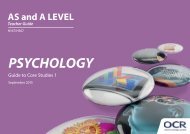PSYCHOLOGY
VjSgV
VjSgV
You also want an ePaper? Increase the reach of your titles
YUMPU automatically turns print PDFs into web optimized ePapers that Google loves.
Section 1: Nature/Nurture<br />
AS and A Level Psychology<br />
1.7 Real life applications of using the nurture side of the debate<br />
Teacher Guide<br />
Students are given a number of treatments, therapies and interventions that are used by researchers that adopt the<br />
nurture side of the debate.<br />
The aim of the task is to encourage students to consider the applications of the nurture side of the debate and the<br />
effect this has on the treatment of behaviours.<br />
The key message for students to understand is that the nurture position in the debate believes behaviour can be<br />
changed and applications often work to remove negative behaviours and improve factors in a person’s environment<br />
to produce positive results.<br />
Suggested delivery:<br />
1. Students complete the accompanying student worksheet using resources provided by the teacher. The use of<br />
computers and the internet would be beneficial for this task.<br />
2. Students can then be directed to research that demonstrates each of the applications, some of these may be<br />
selected from component<br />
3. Students can then be asked the following exam style question for component 2 Section B.<br />
Suggest one strength of claiming that behaviour is only due to nurture. Support your answer with evidence from one<br />
appropriate core study. (3)<br />
Suggested studies for the applications:<br />
Application<br />
Classical conditioning<br />
including systematic<br />
desensitisation and flooding<br />
Operant conditioning<br />
including token economy<br />
Positive role models<br />
Suggested study or topic area to use<br />
Behaviourist explanations of phobias e.g. McGrath’s research on Lucy, a balloon<br />
phobic girl.<br />
Chaney et al (2004) Funhaler used to reward correct use of inhaler.<br />
Bandura et al (1961) Transmission of aggression.<br />
Highlights the importance of models behaviour.<br />
1.8 Researching in the nature/nurture debate<br />
Students need to understand the arguments both for and against adopting different positions within the nature/<br />
nurture debate. By identifying the key methodological choices researchers at each extreme of the debate use<br />
students can analyse the arguments for each position.<br />
The worksheet directs students to select the correct methodologies and justify why these are used in the two<br />
extreme positions in the debate.<br />
Suggested delivery:<br />
1. Students complete the accompanying worksheet and match research methods to each position in the debate.<br />
2. Students discuss similarities between the methods used in each position of the debate.<br />
3. A class discussion of the implications of each type of research supports students understanding of the<br />
restrictions and benefits of different research choices.<br />
6<br />
Copyright © OCR 2015





